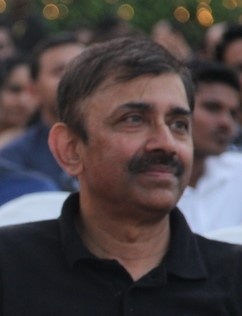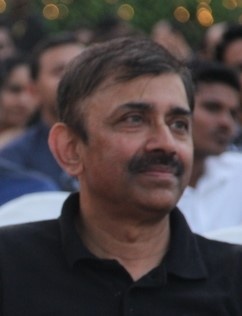Life in Programming: Interview With Ajay Sathe

 We were excited to learn recently that Ajay Sathe, the CEO of our India Operations, was awarded lifetime honorary membership of PhUSE in recognition of his contributions to the influential statistical programming organization. Ajay is a well-known figure in the global statistical programming community and in this blog we chat with him about his work, the important role of PhUSE in the industry, and what excites him most about work in the biopharma sector.
We were excited to learn recently that Ajay Sathe, the CEO of our India Operations, was awarded lifetime honorary membership of PhUSE in recognition of his contributions to the influential statistical programming organization. Ajay is a well-known figure in the global statistical programming community and in this blog we chat with him about his work, the important role of PhUSE in the industry, and what excites him most about work in the biopharma sector.
Could give me an overview of your role at Cytel?
I currently wear two hats at Cytel. The first is my role as head of the Indian operations of Cytel. This began almost 20 years ago with the initiation of our software development team in India and later expanded to include clinical research services, as this team grew to various locations. Jointly with Jim Baker, our Senior VP of Clinical Research Services, I also lead the Functional Service Provider ( FSP) business of Cytel.

It was exciting to learn about your lifetime honorary membership of PhUSE. Can you tell us about your role in the organization?
PhUSE was traditionally a European organization but around nine years ago at a PhUSE annual conference, there was an open forum discussion about the potential of large audiences in Asia. This was followed by a call for a volunteer to explore taking the PhUSE movement to India. I was quick to respond, and it worked very well. A couple of years later we started to run events in India for the first time. Because activities were picking up pace very rapidly, the PhUSE board invited me to join them with a specific mission of creating ongoing movement and activity in Asia. In this capacity, I served on the PhUSE board of directors for two years in 2015 and 2016 before handing over the mantle to an industry colleague.
The activity began in India and quickly spread to China and Japan. I eventually set up regional working groups and we began running PhUSE “SDEs” (Single Day Events) across all three countries. I'm very happy to say that it has become a regular feature, with the result that now in Asia, there are thousands of PhUSE members. Conventionally, there has always been an annual PhUSE conference in Europe, but now in addition to its first US conference in 2018, PhUSE is considering starting up an annual event in Asia. I'm hoping that I'll be able to contribute to that effort, as well as continue to contribute new ideas to the PhUSE events globally.
What role does PhUSE play in supporting drug development?
Right from the beginning, PhUSE has been intensely technical. The membership prides itself on the annual conference being technical rather than commercial. It’s a meeting of minds characterized by high intelligence, bright ideas, and innovations. Over the years, PhUSE has played a fabulous role in developing templates and guidances that eventually became industry standard. PhUSE has also succeeded in creating working groups that collaborate with regulators like the FDA and the EMA. These regulators now recognize PhUSE as an important contributor of thought leadership, and indeed some of their recent official guidance documents have been developed in partnership with PhUSE.
Over the years, PhUSE has evolved from initially writing smart programs to improve statistical programming efficiency, and transformed into a think tank for regulatory guidance and good industry practice. The organization today is a formidable technical community with deep expertise and industry experience. It also has a very agile structure that allows it to quickly deliver proposals that could soon become industry standards. While PharmaSUG has a similar approach and effort, by definition it is linked to a single form of technology- SAS. And of course, while SAS is universally used, the industry requires other tools and technologies. PhUSE obviously acknowledges and recognizes the importance of SAS, but is not limited to it and brings in multiple technologies to make sure the community is prepared for the future needs of the industry. Importantly the organization is playing a vital role in developing the next generation of technology professionals through initiatives such as the university day at the conference.
Cytel has long been an active supporter and contributor to the PhUSE movement. An exemplary mention would be our colleague in Geneva, Angelo Tinazzi, who is a a recognized presenter, a prolific contributor to the PhUSE Wiki, and an occasional stream chair for presentations.
How do you think PhUSE will evolve further?
I already see PhUSE focusing on some newer needs such as risk-based monitoring, data from real-world evidence, and data from social media where text analytics are required. PhuSE has very good antennae for listening to evolving industry requirements and bringing the appropriate technologies into the fold. It achieves that through establishing specialized working groups with voluntary participation in different expert areas. So, for example, there is a working group for regulatory compliance to develop new ways of thinking, and sometimes new tools that are made available to the whole community. PhUSE has also contributed a lot of ideas to groups like TransCelerate.
Let’s explore your career. How did you get started out in the industry?
That’s interesting. I studied engineering first, then followed it up with an MBA. Although I studied to become a manager, I always remained a programmer at heart. Right from the beginning, my interest has been in quantitative methods like optimization and I have participated in writing algorithms, engines, and methods to improve automation and efficiency.
I got started in the drug development field through Cytel. When Cytel wanted an India presence for software product development, one of the founders reached out to me and I saw a fabulous opportunity to work in this sector. When we ultimately started supporting outsourced biometrics services, the programmer in me was always looking for opportunities to speed up work or to reduce the more labor-intensive and routine tasks by developing automation tools. Some of these were very successful, and we were able to pass on the benefit of this efficiency to our clients. That’s how I got really excited about the field, and we still continue to develop very useful tools at Cytel.
"Seeing our work translate into visible human benefit gives a fantastic sense of purpose to what you're doing. That's extremely gratifying and satisfying."

What excites you most about working in the industry?
This is one industry where I see infinite scope for innovation because drug development is such an extensive and complicated process. Technical people love the opportunity to invent and create something. In this environment, several very small simple innovations can result in dramatic benefits. Not only cost benefits and commercial benefits but the enormous human benefit that derives from bringing better therapies to market quickly. On the flipside, if some therapies are not going to make the cut, we need to reach that conclusion quickly so that investment in the wrong direction can be curtailed.
What is most exciting about this industry is that even when working from a biometrics standpoint, we are often able to see the real-life benefit. Whenever we hear about FDA approval for a drug that we have supported, it's a very proud moment for us. Then we can look back on how the smart ideas that we implemented helped bring the therapies to the market more quickly. Seeing our work translate into visible human benefit gives a fantastic sense of purpose to what you're doing. That's extremely gratifying and satisfying.
Interested in learning more about our statistical programming solutions? Click the button below.
Cytel also has a new webinar on on statistical programming for CDISC. Click below to learn more.
About Ajay Sathe

Ajay Sathe is Chief Executive Officer of Cytel's India Operations, headquartered in Pune, India. Ajay oversees the delivery of software development and biometrics outsourcing services within the region. His strong management track record includes applications development, product management and governance of outsourced services.
Prior to joining Cytel Inc., Ajay was Founder and Technical Director at Spectrum Business Support Ltd., where he led teams building both WordMiner, an information retrieval library, and Jurix, a law information service.
Ajay Sathe studied Electronics Engineering at Banaras Hindu University, India, and received his MBA from The Indian Institute of Management, Ahmedabad.



